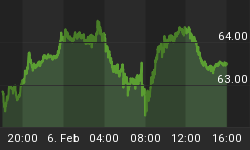While most analysts and commentators seem to have been expecting higher inflation and even hyperinflation, the latest US money supply statistics rather indicate deflation, or even hyperdeflation.
The US money supply fell by an annualized rate of 9.6 percent according to the latest statistics and the rate is accelerating. This is a decline not seen since the 1930's and this comes at a time of the zero interest rates, gigantic stimulus packages all over the world and the Fed and other central banks monetizing debt at levels unheard of.
So what's really happening? Why don't we see higher inflation or hyperinflation like so many experts have predicted? Can anyone explain this?
Early warning
Two weeks ago I read the following:
"All the signs around us point to deflation. The money supply is being pumped up on an unprecedented scale, but all it does is pushing on a string."
This was written by someone that actually has been addressing the dangers of deflation or hyperdeflation for quite some time. Just as inflation and hyperinflation can destroy the currency and create major problems in production, so can deflation and hyperdeflation. But he has never excluded the risk of hyperinflation, only provided theoretical reasons for the risk of hyperdeflation as well. And now those reasons seem to be in place.
Inflation and deflation
It is conceivable that while the broader money supply measures are contracting, the narrower measures might be expanding. So while a there is inflation in one part of the whole, there is deflation in the whole.
This is what seems to be happening today in the US. The government and the Fed is creating new money like the masters of Zimbabwe but the rest of the people are still loosing money at much larger amounts.
It simply doesn't matter how much the politicians and central banks try to pump up money supply right now, they only control a minor part of it and the far bigger chunk appears to be collapsing.
The mechanics of the simultaneous inflation and deflation might well be that we end up with high inflation or hyperinflation after all. As the government and central banks steps up their measures to inflate, the deflation in the rest of the money supply might well accelerate. As this continues, the relative size of the narrower government controlled part increases and eventually might come to dominate, and instead we get inflation or even hyperinflation.
Wealth protection
It's important to point out that we don't have this apparent deflation despite of the preceding race towards zero interest rates and stimulus packages, but rather because of them. The former destroys balance sheets, not the opposite. The latter destroys the value of the currency, not the opposite, thus further eroding the balance sheets.
This might all come as a surprise to many people unless they are able to look behind the smoke screens created by the power elites. After all, some people are on the receiving end of all of these measures and they are happy to play along in this Potemkin village.
But if you really want to protect your wealth it's time to start looking for new sources of information and analysis before it's too late. If you read this, you have come a long way. But I can assure you that this came as no surprised to me, because I've been reading Professor Antal Fekete's columns and more theoretical writings for years. And I've been spreading the message as good as I can (see here and here) to those with an open mind, and they are not so few judging from the feedback I get.
We seem now to be facing deflation rather than inflation, hyperdeflation rather than hyperinflation, at least at first. These are the facts; do you know how to act on them? I have a clear plan for my part, but that's another story...















